IOS organises Seventh Qazi Mujahidul Islam Memorial Lecture on “Sufism: Relevance and Significance in Contemporary Context”
April 18, 2015 at IOS Conference Hall, New Delhi
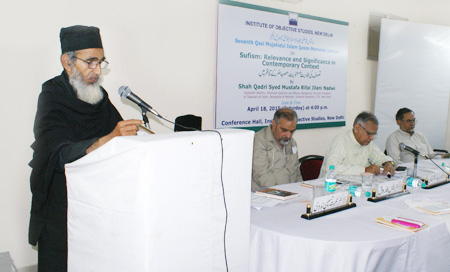
Speaker: Shah Qadri Syed Mustafa Rifai Jilani Nadwi, Sajjadah Nashin, Khanqah Qadriya wo Rafaiya, Bangalore ando on the stage from left to right: Dr. S. Farooq, Chairman, Tasmia Education and Social Welfare Society & Himalaya Drugs; Prof. ZM Khan, Secretary General, IOS; Maulana Khalid Husain Nadwi, Member-Secretary, IOS Centre for Arabic and Islamic Studies
New Delhi: April 18: The Institute of Objective Studies organised the Seventh Qazi Mujahidul Islam Memorial Lecture on “Sufism: Relevance and Significance in Contemporary Context” at the conference hall of the Institute here on April 18, 2015. Delivering the lecture, Shah Qadri Syed Mustafa Rifai Jilani Nadwi, Sajjadah Nashin, Khanqah Qadriya wo Rafaiya, Bangalore, Founder President of Idaarah Al-Islah, Bangalore and Member General Assembly, IOS, New Delhi, noted that Sufism did not denote merely to dress up in woolen garments and patched clothes, nor did it mean to go into a state of ecstasy at a melodious devotional song (qawwali) sung by a qawwal. He explained that a Sufi’s exterior and his inner self should be clean, purified and without malice towards anybody. Besides, a Sufi was required to protect and preserve his knowledge, behaviour, religion and Shariah. He said that Sufism rested on four pillars, viz; love for Allah, strict allegiance to Quranic commands, fear of the Day of Judgment and aversion to the destructible, mundane world.
Referring to the noted Sufi Al-Sheikh Abu-Yazid Bustami’s (RA) observation, Shah Qadri Syed Mustafa Rifai held that if one saw a claimant having attained the power to enact miracles like floating in the air, he must not be trusted unless he was a true believer of Allah and a down-to-earth practitioner of the Shariah.
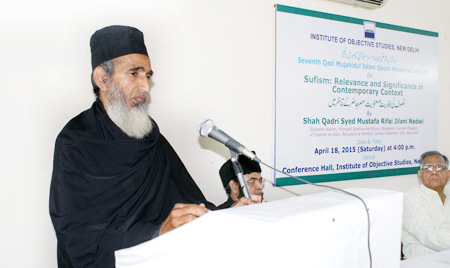
Shah Qadri Syed Mustafa Rifai Jilani Nadwi, Sajjadah Nashin, Khanqah Qadriya wo Rafaiya, Bangalore deliveres his lecture
Any practice of a Sufi other than following the commands of Quran and Hadith, was not worthy of note. Quoting Hazrat Abdul Qadir Geelani (RA), he said that if a Sufi sheikh did not possess five qualities, he was like a liar who would lead the believers to ignorance. He should be well aware of the explicit commands of the Shariah. He must be consciously pursuing the path of reality and cessation. He was also expected to receive his visitors with warmth and affection. He said that a true Sufi should mix with the common people not for show off but for real concern and his actions must not be at variance with his utterances. He must teach his disciples and the seekers the high moral standards and extend patronage to them. He must also have a clear understanding of the distinction between halaal and haraam (due and undue). Such a Sufi sheikh deserved an exalted position, he observed.
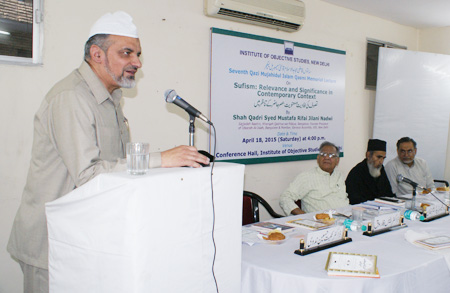
Dr. S. Farooq, Chairman, Tasmia Education and Social Welfare Society & Himalaya Drugs deliveres his views
Explaining the relevance of Sufism in the contemporary world, Maulana Rifai insisted that purity of soul, abstinence and obligation were three elements that constituted Sufism. Provision of initiation in the Sufi order, had been made to achieve these qualities. He said that a seeker should get initiated into a Sufi order by a sheikh or a master who was a real practitioner of shariah. He held that this found a mention in Hadith.
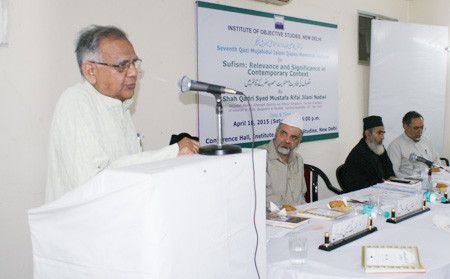
Prof. ZM Khan, Secretary General, IOS deliveres presidential remarks
Earlier, the Member-Secretary of the IOS Centre for Arabic and Islamic Studies, Maulana Khalid Husain Nadwi, in his introductory remarks, enlightened the audience on the association of Qazi Mujahidul Islam with the IOS Chairman Tasmia Educational and Welfare Society, Dr. S. Farooq said that a Sufi was one who was enlightened and was above temporal practices. In this connection, he referred to his Pir (master) Maulana Masih-Ullah Khan, whom he described as an embodiment of this trait. In his presidential address, Secretary General of the IOS Prof. Z M Khan noted that the people today had the potential to destroy the world, but the religious or soft power could save the earth from destruction. It was the sufis who possessed this power and their power was needed the most in the present context. He said that Sufism was meant for those only who exercised restraint and practised abstinence.
The lecture began with the recitation of a Quranic verse by Hafiz Athar Husain Nadwi. Arabic scholar Dr. Nakhat Husain Nadwi conducted the proceedings.
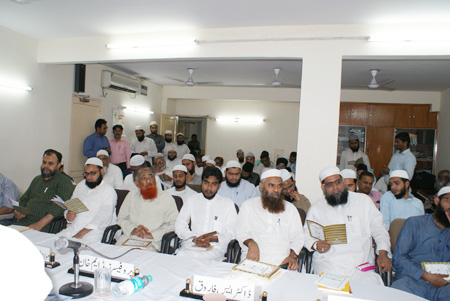
A view of audience
Those who attended the lecture included the Vice-Chairman of the IOS, Prof. Refaqat Ali Khan, Assistant Secretary General of the IOS, Prof. Afzal Wani, Associate Prof. of Law Jamia Millia Islamia, Dr. Eqbal Husain, Mr. Mushtaq Ahmed, Advocate, Ameen Usmani, Abdul Malik Qasmi, Mufti Baqar Arshad, Sulaiman Khan, Dr. Jameel Ahmed, Dr. Muzaffar Husain Ghazali, Mohd. Salim Ashraf Qasmi, Syed Mohsin Ali Kirmani, Imran Akif Khan, Dr. Safdar Ali Nadwi, Prof. Shafiq Ahmed Nadwi, Prof. Hasina Hashia of JMI, Waqaruddin Latif, Junaid Ahmed Banarsi, Safi Akhtar, Dr. Bismil Arifi, besides a number of Arabic scholars.
|